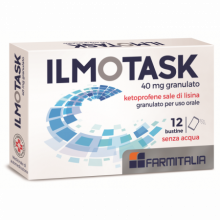ZERINODEK DECONG * SPR 10ML 0.1%
Therapeutic indications
Nasal decongestant for rhinitis, colds, sinusitis.
Dosage and method of use
ZERINODEK DECONGESTANT NASAL Nasal spray, solutionDosage Adults: 1 or 2 sprays per nostril, 2 - 3 times a day.Children over 12 years old: 1 spray per nostril, 1 or 2 times a day.Method of administrationTo nebulize the preparation, press the valve holding the package between the index, middle and thumb. At the beginning press 2-3 times without pressure (not in the nostrils) to have a regular nebulization.ZERINODEK DECONGESTANT NASAL nasal gel Dosage Adults: 1 application per nostril, 2 or 3 times a day.Children over 12 years old: 1 application per nostril, 1 or 2 times a day.Method of administrationEach application of gel, per nostril, must be equal to a grain of rice. It is recommended to strictly follow the recommended doses. In any case, the treatment must not be continued for more than 4 days. If symptoms persist, a clinical re-evaluation should be considered.
Contraindications
Hypersensitivity to the active substance or to any of the excipients listed in section 6.1. Contraindicated in: - severe heart disease and arterial hypertension, - glaucoma and in particular in closed angle glaucoma, - prostatic hypertrophy, - hyperthyroidism, - patients who have undergone transphenoidal hypophysectomy or trans-nasal surgery with exposure of the dura mater. Not to be used during and for two weeks following therapy with antidepressants, such as tricyclic antidepressants or monoamine oxidase (iMAO) inhibitors (see section 4.5). The drug is contraindicated in children under 12 years of age.
Side effects
List of adverse reactions by MedDRA system organ class.Adverse reactions listed below are ranked using the following convention: very common (≥1 / 10); common (≥1 / 100 to Respiratory, thoracic and mediastinal disorders Epistaxis. Frequency not known:Disorders of the immune systemHypersensitivity.Nervous system disordersHeadache, insomnia.Vascular pathologiesHypertension.Cardiac pathologiesTachycardia, palpitations, reflex bradycardia.Respiratory, thoracic and mediastinal disordersNasal discomfort, nasal congestion.Gastrointestinal disordersNausea.Renal and urinary disordersDisorder of urination.Reporting of suspected adverse reactionsReporting of suspected adverse reactions that occur after authorization of the medicine is important, as it allows continuous monitoring of the benefit / risk ratio of the medicine. Healthcare professionals are asked to report any suspected adverse reactions via the national reporting system at www.aifa.gov.it/content/segnalazioni-reazioni-avverse.
Special warnings
Patients with long QT syndrome treated with xylometazoline may be at increased risk for severe ventricular arrhythmias. Use with caution, due to the danger of urinary retention, in the elderly. Xylometazoline should be used with caution, and only under medical advice, in patients with diabetes mellitus, hypertension, heart disease and pheochromocytoma. Repeated use of the drug for long periods can be harmful. The prolonged use of vasoconstrictors can alter the normal function of the nasal mucosa and paranasal sinuses, also inducing addiction to the drug. Prolonged use should be avoided because rebound congestion with hyperemia may occur. This may require repeated treatment with the risk of chronic rhinitis and atrophy of the nasal mucosa. Important information about some of the ingredients ZERINODEK DECONGESTANT NASAL Nasal spray, solution contains benzalkonium chloride (BAC) which ZERINODEK is irritating and may cause local skin reactions. When used for long periods, it can cause swelling of the nasal mucosa. If such a reaction (persistent nasal congestion) is suspected, a BAC-free nasal medicine should be used if possible. If such nasal medications without BAC are not available, another pharmaceutical form should be considered. ZERINODEK NASAL DECONGESTANT in gel contains propyl parahydroxybenzoate. It can cause allergic reactions (even delayed). The use, especially if prolonged, of topical products can give rise to sensitization phenomena and produce unwanted effects; in this case it is necessary to interrupt the treatment and, if necessary, institute a suitable therapy.For those who carry out sporting activities: the product contains substances prohibited for doping and can determine positive anti-doping tests.
Pregnancy and breastfeeding
Due to lack of data, the use of the product during pregnancy and breastfeeding should be avoided. Administration should only be considered if the expected benefit to the mother outweighs the risk to the baby.
Expiration and retention
ZERINODEK DECONGESTANT NASAL Nasal spray, solution Store below 25 ° C. ZERINODEK DECONGESTANT NASAL nasal gel Store at a temperature below 30 ° C.
Interactions with other drugs
Not to be used in conjunction with antidepressant drugs, such as tricyclic antidepressants or MAO inhibitors. These can in fact cause an increase in blood pressure due to their effects on the cardiovascular system (see section 4.3).
Overdose
In case of excessive use, especially in children, systemic effects typical of alpha-sympathomimetic agents may occur. Symptoms include hypertension, photophobia, nausea, dizziness, headache, insomnia, palpitations, tachycardia, arrhythmias, anxiety, chest tightness, depression of the central nervous system with marked sedation (which may be associated with hypothermia, bradycardia, sweating and dizziness) and that can lead to coma. In case of overdose or accidental oral intake, patients should be referred to a health facility and appropriate emergency measures taken.
Active principles
100 mL of solution contain: Active principle : xylometazoline hydrochloride 100 mg Excipient with known effect: benzalkonium chloride. 100 g of gel contain: Active principle : xylometazoline hydrochloride 100 mg Excipient with known effect: propyl parahydroxybenzoate. For the full list of excipients, see section 6.1.
Excipients
ZERINODEK DECONGESTANT NASAL Nasal spray, solution: Monobasic potassium phosphate, sodium chloride, disodium phosphate dihydrate, polysorbate 20, edetate disodium, eucalyptol, Neroli essence, benzalkonium chloride, purified water. ZERINODEK DECONGESTANT NASAL nasal gel: carbomers, sodium hydroxide, propyl parahydroxybenzoate, eucalyptol, Neroli essence, purified water.

 Convenient and safe payments
Convenient and safe payments
 Shipping in 24h all over the world
Shipping in 24h all over the world
 Fast returns
Fast returns
 Pharmaceutical experience
Pharmaceutical experience









